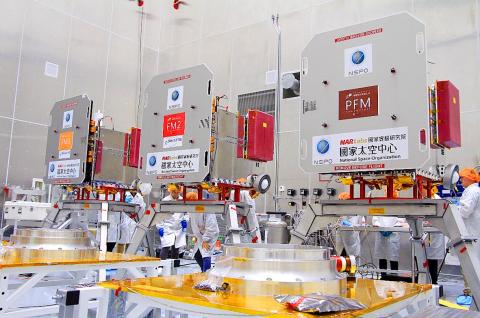Weather data collected through the Formosat-7 satellite system can now be downloaded through the Central Weather Bureau’s (CWB) Taiwan Analysis Center for COSMIC (TACC), the bureau said yesterday.
COSMIC stands for Constellation Observing System for Meteorology, Ionosphere and Climate.
The six micro-satellites, a Taiwan-US joint venture, were launched into space on June 25.

Photo courtesy of the Central Weather Bureau
The center yesterday started providing meteorological observation data for download after scientists spent five months testing, adjusting and certifying the system, the bureau said.
Meteorologists from around the world can now download data collected by the system from October to Sunday from the center’s Web site — tacc.cwb.gov.tw/v2/download.html.
Starting from Dec. 23, people can every other Monday download data collected the previous two weeks, it said.
The National Space Organization (NSPO), which is in charge of ensuring that the Formosat-7 system is functioning normally, said that the six satellites in the system carry the Tri-GNSS radio occultation system, which collects first-hand data from the atmosphere and ionosphere.
TACC then decodes and calculates the collected data, and releases information on the atmosphere’s temperature, humidity and electron concentration, NSPO said.
The weather bureau said that its weather forecast system had improved after it received the first batch of data from Formosat-7 on July 16.
“The satellite system is particularly strong in collecting data from mid and low-altitude regions. We are using it to improve our ability to monitor and forecast extreme weather and space weather,” the bureau said.
The bureau said that this would be a trial operation before the official launch next year, adding that scientists from both countries aim to improve the data quality based on users’ feedback.

TRAGEDY STRIKES TAIPEI: The suspect died after falling off a building after he threw smoke grenades into Taipei Main Station and went on a killing spree in Zhongshan A 27-year-old suspect allegedly threw smoke grenades in Taipei Main Station and then proceeded to Zhongshan MRT Station in a random killing spree that resulted in the death of the suspect and two other civilians, and seven injured, including one in critical condition, as of press time last night. The suspect, identified as a man surnamed Chang Wen (張文), allegedly began the attack at Taipei Main Station, the Taipei Fire Department said, adding that it received a report at 5:24pm that smoke grenades had been thrown in the station. One man in his 50s was rushed to hospital after a cardiac arrest

SAFETY FIRST: Double the number of police were deployed at the Taipei Marathon, while other cities released plans to bolster public event safety Authorities across Taiwan have stepped up security measures ahead of Christmas and New Year events, following a knife and smoke bomb attack in Taipei on Friday that left four people dead and 11 injured. In a bid to prevent potential copycat incidents, police deployments have been expanded for large gatherings, transport hubs, and other crowded public spaces, according to official statements from police and city authorities. Taipei Mayor Chiang Wan-an (蔣萬安) said the city has “comprehensively raised security readiness” in crowded areas, increased police deployments with armed officers, and intensified patrols during weekends and nighttime hours. For large-scale events, security checkpoints and explosives

A car bomb killed a senior Russian general in southern Moscow yesterday morning, the latest high-profile army figure to be blown up in a blast that came just hours after Russian and Ukrainian delegates held separate talks in Miami on a plan to end the war. Kyiv has not commented on the incident, but Russian investigators said they were probing whether the blast was “linked” to “Ukrainian special forces.” The attack was similar to other assassinations of generals and pro-war figures that have either been claimed, or are widely believed to have been orchestrated, by Ukraine. Russian Lieutenant General Fanil Sarvarov, 56, head

PUBLIC SAFETY: The premier said that security would be tightened in transport hubs, while President Lai commended the public for their bravery The government is to deploy more police, including rapid response units, in crowded public areas to ensure a swift response to any threats, President William Lai (賴清德) said yesterday after a knife attack killed three people and injured 11 in Taipei the previous day. Lai made the remarks following a briefing by the National Police Agency on the progress of the investigation, saying that the attack underscored the importance of cooperation in public security between the central and local governments. The attack unfolded in the early evening on Friday around Taipei Main Station’s M7 exit and later near the Taipei MRT’s Zhongshan